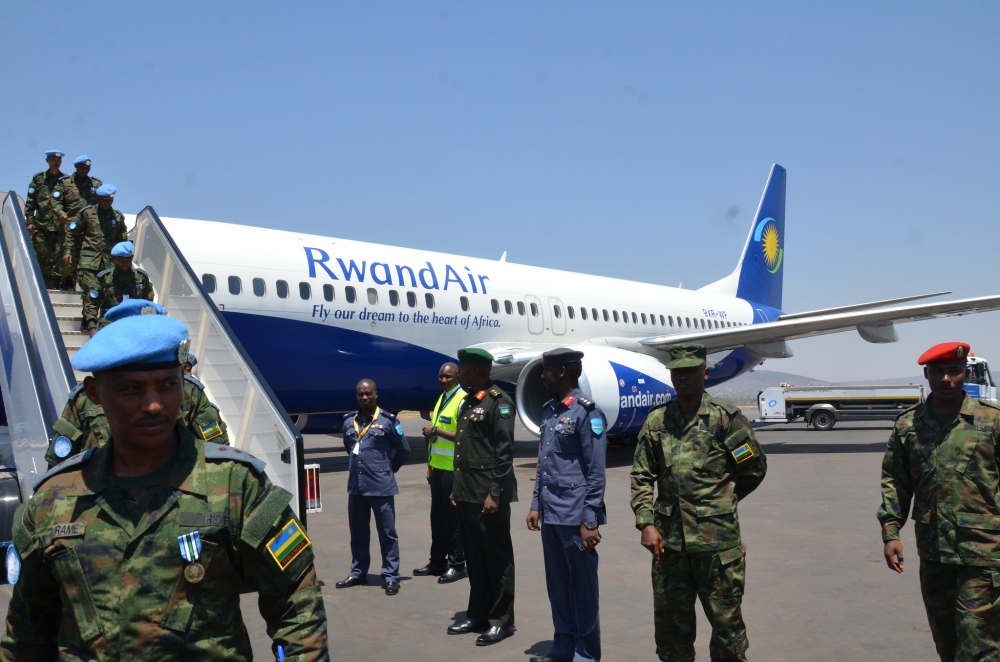

Rwanda’s contribution to the United Nations peacekeeping missions was inspired by the country’s history of the 1994 Genocide against the Tutsi and insecurity, says Rwanda Defence Force Spokesperson Brig Gen Ronald Rwivanga.
Despite the failure to protect the Tutsi in 1994 by UNAMIR, the UN mission that was in Rwanda during the Genocide, which left thousands of men, women and children in the hands of marauding Interahamwe militia, 10 years later, Rwanda sent its troops to help other countries through similar missions.
ALSO READ: 73,000 Rwandan troops deployed abroad
2024 marks the 20th year since Rwanda began to contribute troops to UN Peacekeeping missions. Since 2004, more than 73,000 Rwandan troops have been deployed to these missions, most on the African continent.


"In 1994, the RPA [Rwanda Patriotic Army] and the general community was deserted by the United Nations peacekeeping force, partly because they were not given the requisite reinforcements,” said Rwivanga in an interview with The New Times on the occasion of the 30th anniversary of liberation.
WATCH: Gen Rwivanga: RDF strives to be a transformational army
"Our joining peacekeeping missions was based on the fact that we needed to set an example of how it should be done.”
Rwanda’s first deployment to a UN peacekeeping mission was in the Darfur region in Sudan.
"We were the first force to deploy in Darfur and this was driven by our desire to set a very good example in responding towards acts of genocide,” Rwivanga noted, adding that Rwanda’s contribution played "a very significant part in creating stability in Darfur.”
ALSO READ: Rwandan troops embody values of peacekeeping in life-threatening situations, says UN official
Rwanda troops have since been part of UN missions in South Sudan, the Central African Republic (CAR), among other countries.
As of April, Rwanda was the third largest troop contributing country to UN peacekeeping operation, with nearly 6,000 troops deployed to the Central African Republic, South Sudan.
ALSO READ: Kagame says Rwanda won’t be absent in face of humanitarian crisis
Besides the UN Peacekeeping Operations, Rwanda in recent years engaged in a new form of peace operations, which are bilateral in nature.
In 2021, the country sent troops to the Central African Republic and Mozambique to support Bangui and Maputo to restore state authority.
"It all started from the bilateral agreements that were signed between our countries, but also because they had requested our country to help, based on our track record, based on our history,” said Rwivanga.
ALSO READ: Rwanda, Mozambique step up fight against terrorism
In both cases, Rwandan troops recorded gains within the first weeks of deployment.
"In the Central African Republic, President Faustin-Archange Touadera requested our President to support in bringing stability and this was clearly a legitimate concern,” he said. "It was necessary for us to support.”
Rwivanga noted that Mozambican President Filipe Nyusi requested his Rwandan counterpart Paul Kagame for help, probably based on the track record of the Rwandan troops in CAR.
ALSO READ: Experts: Peacekeeping missions need a rethink
Rwanda deployed troops to Mozambique’s northern province of Cabo Delgado, which had been paralysed by Islamic State-linked terrorists.
"We were called in and our force was ready. Within one month, we were able to dislodge these insurgents from all their strongholds,” he said, adding that although the terrorists have not been wiped out from all parts of Cabo Delgado, "we have already covered about three quarters of the journey.”
Asked if the bilateral model of peace operations had proved to be more efficient than the UN model, Rwivanga said each had its own advantages.
"One does not replace the other,” he said.
"One of the advantages of bilateral interventions is that you don't have to go through the bureaucracies that the multilateral organisations of the United Nations and the African Union need to go through,” he said.
"But this is not to say that if they decide to engage, they are not as effective.”
He said the multilateral interventions had the advantage of being well financed and with a big number of troops. They also prove efficient in the aftermath of operations, where communities are provided with necessary humanitarian assistance.
"The United Nations is perfect in that line of support,” he said.
Rwivanga said that while multilateral interventions may have the "problem of unity of command” as each country operates its own doctrine, the advantage to the bilateral operations is that the two armies act as a unified force.


